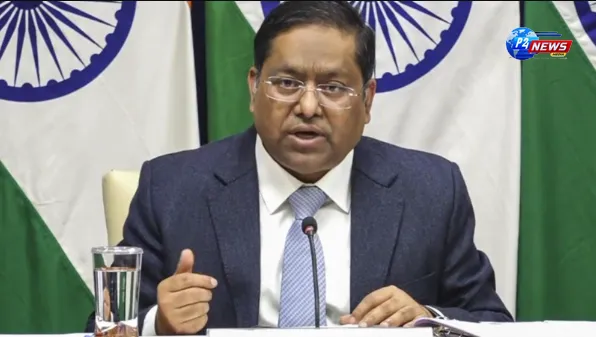Mahfuz Alam stirred controversy by sharing a map on Facebook that depicted regions of West Bengal, Tripura, and Assam as part of Bangladesh. The post, which drew significant criticism, was removed shortly after its publication.
Mahfuz Alam stirred controversy by sharing a map on Facebook that depicted regions of West Bengal, Tripura, and Assam as part of Bangladesh. The post, which drew significant criticism, was removed shortly after its publication.
New Delhi: India has expressed its strong discontent to Dhaka regarding a now-removed post on social media by a prominent aide of Bangladesh's interim government, which suggested that certain regions currently recognized as Indian territory should belong to Bangladesh. Mahfuz Alam, a figure known for making controversial statements, had shared a map on Facebook that allegedly depicted portions of West Bengal, Tripura, and Assam as Bangladeshi territory, but he promptly deleted the post following a significant backlash.
Mr. Alam serves as a de facto minister in the interim administration led by Muhammad Yunus in Bangladesh. In response to the situation, External Affairs Ministry spokesperson Randhir Jaiswal emphasized the importance of being cautious with public statements. "We have addressed this matter with the Bangladeshi government and have formally lodged a protest. It is understood that the contentious post has been taken down," he stated.
Jaiswal further remarked on the need for all parties to exercise caution with their public expressions. He reiterated India's ongoing commitment to fostering positive relations with both the Bangladeshi populace and the interim government, while also highlighting that such remarks highlight the critical nature of responsible communication.
The relationship between India and Bangladesh has been under considerable pressure since Mr. Yunus took office in August. He assumed leadership of the interim government shortly after the previous Prime Minister, Sheikh Hasina, resigned and sought refuge in India amid widespread protests against her administration.
In response to inquiries regarding Mr. Yunus's lack of a specific timeline for parliamentary elections in Bangladesh—proposed to occur between late 2025 and early 2026—Jaiswal refrained from providing a definitive comment. "Our position toward Bangladesh is clear. We advocate for a democratic, stable, peaceful, progressive, and inclusive Bangladesh," he added.
Jaiswal also mentioned India's readiness to cultivate a constructive relationship with Bangladesh, founded on mutual trust, respect, and sensitivity to each country’s respective interests and concerns. He underscored that the citizens of Bangladesh are the primary stakeholders in the ongoing relations, noting India's extensive development cooperation and multifaceted engagements with Bangladesh, which encompass areas such as connectivity, trade, energy, and capacity building—all aimed at benefiting the Bangladeshi people.
During a national address on December 16, Mr. Yunus suggested that elections might be held between late 2025 and early 2026, contingent upon the successful implementation of various reforms. When questioned about Mr. Yunus's remarks regarding his willingness to host the delayed SAARC summit in Bangladesh after discussions with Pakistan's Prime Minister Shehbaz Sharif in Cairo, Jaiswal reiterated India’s commitment to promoting regional cooperation through various platforms.
He pointed out that India aims to advance collaboration through organizations such as BIMSTEC while acknowledging that SAARC, which includes nations like India, Afghanistan, Bangladesh, Bhutan, the Maldives, Nepal, Pakistan, and Sri Lanka, has faced challenges in effectiveness since its last biennial summit in 2014. The planned SAARC summit in 2016 was canceled following India's withdrawal in light of a terrorist attack in Uri, Jammu and Kashmir, which led to Bangladesh, Bhutan, and Afghanistan also opting out of the Islamabad meeting.
In recent years, India has actively sought to reinvigorate BIMSTEC, promoting it as a dynamic forum for regional cooperation due to the stagnation within SAARC. These efforts highlight India's commitment to collaborating with regional partners while addressing ongoing challenges and fostering stable relationships.
Like
Dislike
Love
Angry
Sad
Funny
Pray
'Trump Tracker: Tulsi Gabbard's Surprising Appointment as US Intelligence Chief
November 14, 20249th Ayurveda Day in Melbourne: A Celebration of Ayurvedic Innovations and Global Health Impact
November 10, 2024🍪 We Value Your Privacy and Experience Hi there! We use cookies to enhance your browsing experience, provide personalized content, and analyze site traffic. By continuing to use our site, you consent to our use of cookies.







Comments 0